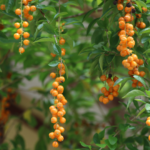Introduction
The golden dewdrop (duranta erecta) is an evergreen shrub or small tree in the verbena family. It makes a great garden selection. Other common names are “sapphire showers,” “pigeon berry,” and “sky flower.” The name “golden dewdrop” refers to the round, yellow-orange fruits produced during late summer and fall. Meanwhile, some scholars state that the tree’s fruits and leaves are toxic to humans. Moreover, they can be fatal to children and dogs if eaten, but coincidentally, they do not harm the birds. The name “sapphire showers” references the hundreds of clusters of light blue, white, or violet blossoms the tree produces during the growing season.
Origin and Description
Many have debated the origin of the duranta erecta. According to some sources, the tree is endemic to the Florida Keys, the West Indies, and Central America. When planting this tree, keep in mind that it can also become invasive in tropical regions. Furthermore, it has a tendency to grow in a weeping manner, and mature trees can have thorns. In cold climates, gardeners can grow the golden dewdrop as an annual. Contrarily, in warm climates, the tree is typically a perennial that can reach as tall as ten to 20 feet.
Lighting
For the most part, the golden dewdrop prefers full sun, which is six or more hours of direct sunlight a day. However, it will also grow in partial shade (direct sunlight only part of the day, 2–6 hours). Keep in mind that less sun will probably result in fewer blooms.
Usages
Landscaping
Landscapers can use the sapphire showers as privacy screens. They can also prune the trees and showcase them as a garden centerpiece. The appealing golden fruits and vivid lavender blooms will embellish the landscape with a cascade of colors.
Container Planting
The duranta erecta performs well in containers. The confinement will allow it to be neater and more compact. Additionally, a container-planted golden dewdrop will also make a good bonsai.

Butterfly and Wildlife Garden
The nectar from the flowers provides a steady supply of nourishment for butterflies and bees. The floriferous clusters allow the insects to feed from bloom to bloom. Hummingbirds are also attracted to the ornamental tree. Although the fruit is harmful to humans, birds can eat the berries with no problem.
More on Duranta Erecta
References
UF/IFAS. (2023, February 10). Golden Dewdrop. https://gardeningsolutions.ifas.ufl.edu/plants/trees-and-shrubs/shrubs/golden-dewdrop.html
NC State Extension. Duranta Erecta- Common Name(s): Golden Dewdrop; Pigeon Berry, Skyflower. https://plants.ces.ncsu.edu/plants/duranta-erecta/




